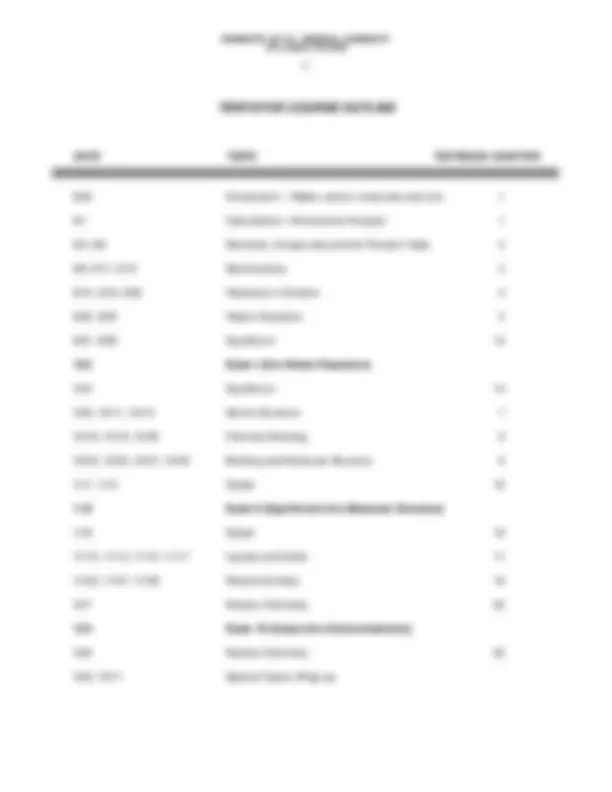



Study with the several resources on Docsity

Earn points by helping other students or get them with a premium plan


Prepare for your exams
Study with the several resources on Docsity

Earn points to download
Earn points by helping other students or get them with a premium plan
Community
Ask the community for help and clear up your study doubts
Discover the best universities in your country according to Docsity users
Free resources
Download our free guides on studying techniques, anxiety management strategies, and thesis advice from Docsity tutors
The syllabus for the general chemistry course, chem 201-01, taught by professor charles h. Clapp during the fall 2000 semester at rb 216. The course objectives, format, textbook, lectures and readings, problems, exams, grading, office hours, and tentative course outline are provided.
Typology: Lab Reports
1 / 3

This page cannot be seen from the preview
Don't miss anything!


The basic principles of chemistry provide fundamental insight into the macroscopic world of materials and organisms. The purpose of this course is to acquaint students with these basic principles and to help students learn to apply these principles broadly and effectively.
There will be three lectures (MWF, 8:00 a.m.) per week. In addition, each student has been assigned to one three-hour lab section. There will also be two recitation sections at time to be arranged. These sections will be used to discuss problems and answer questions.
TEXTBOOK Brady, Russell and Holum, Chemistry: Matter and Its Changes
In reading the textbook you should keep in mind that the primary objective of the course is to develop a working knowledge of important chemical principles. These principles will be discussed in class and they will also be presented in the text, sometimes in a different manner. You will probably understand the principles more thoroughly if you strive to understand both the explanation presented in class and that presented in the text.
Both the lectures and the textbook will provide many examples in which chemical principles are used to solve problems. The examples presented in lecture will be selected to complement those presented in the text. It is recommended that you study carefully all of these examples and then test and extend your understanding by solving problems on your own.
PROBLEMS Since the objective of the course is for students to develop a working knowledge of chemical principles, there will be heavy emphasis on problem solving. Problems will be assigned with every lecture, and it is recommended that you do these problems as soon as possible. These assignments will not be collected, but you should make a determined effort to solve them, since most of the questions on quizzes and exams will involve problem solving. Answers to many of the problems will be placed on reserve in the Bertrand Library, and the problems will be discussed at Recitation Sections. If you have difficulty with the problems, you are urged to consult the instructor.
CHEMISTRY 201-01: GENERAL CHEMISTRY SYLLABUS, Fall 2000 -2-
EXAMS There will be three hour exams and a final. The hour exams will be given during class hour on the following days:
Short (10–15 min) quizzes will be given in class on the following days:
All of the exams and quizzes have been scheduled for Monday, since that is the day that the administration has recommended for exams in classes meeting in this hour in order to avoid back-to-back exams.
GRADING Hour Exams .......45% Quizzes .............15% Laboratory ..........20% Final ...................20%
OFFICE HOURS You are encouraged to consult the instructor if you have difficulty understanding the material in the course. My scheduled office hours are:
Monday 4–5 p.m. Wednesdays 3–4 p.m. Friday 1–2 p.m.
If these times are inconvenient, you can see me after class or contact me by e- mail to make an appointment. You are also welcome to come to my office without an appointment—if I am there and not busy with something else, I will be happy to talk with you.